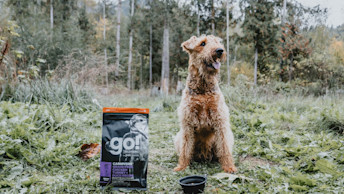June 2, 2025
Why Do Dogs Eat Grass? Understanding This Common Behaviour

If you’ve ever caught your dog munching on grass during a walk or in the backyard, you’re not alone. Many pet parents wonder, why is my dog eating grass? Is it a sign of an upset stomach? A craving for nutrients? Or just a quirky habit? Let’s dig into the reasons behind this common behaviour and what it means for your pup.
Is It Normal for Dogs to Eat Grass?
Absolutely! Eating grass is a common behavior in dogs and, in most cases, is completely normal. While the exact reason can vary from dog to dog, experts believe there are a few key motivations behind it.
Possible Reasons Your Dog Is Eating Grass
1. They Like the Taste and Texture
Some dogs simply enjoy the act of chewing on grass. The taste, texture, smell, and even the slight crunch can be satisfying to them. If your dog is happily nibbling without showing signs of illness, it may just be a preference rather than a concern.
2. They Need More Fibre in Their Diet
Dogs are omnivores, meaning their bodies thrive on a balance of proteins, fats, and plant-based nutrients, including fibre. Grass is a source of insoluble fibre, which can help with gut motility and healthy digestion. If your dog’s diet is lacking adequate fibre, they might instinctively eat grass to fill the gap.

Recommended Solution
Dog Food Made With Fibre-Rich Ingredients
A healthy tummy is key to a happy dog, and easier poop-scooping is key to a happy dog parent. Made with fibre-rich ingredients like whole grains and psyllium husk to support good digestion.
View Digestion + Gut Health recipes
3. They’re Trying to Soothe an Upset Stomach
One of the most common assumptions is that dogs eat grass when they have an upset stomach. Some dogs vomit after eating grass, but studies suggest that this isn’t always the goal1. In fact, most dogs that eat grass don’t show signs of illness before or after1.
4. They’re Bored or Anxious
Just like some people bite their nails or tap their feet when they’re anxious, dogs can develop habits like grass-eating as a way to pass the time or ease stress. If your dog seems to eat grass out of boredom, try increasing playtime, interactive toys, or exercise to keep them engaged.
Should You Be Concerned About Your Dog Eating Grass?
In most cases, eating grass is harmless. However, there are a few things to watch for:
Pesticides and Chemicals – If your dog eats grass treated with pesticides, herbicides, or fertilizers, it could make them sick. Try to keep them away from treated lawns and provide safe alternatives like dog-friendly grasses.
Excessive Grass Eating – If your dog suddenly starts eating large amounts of grass frequently, it might be a sign of an underlying digestive issue. If you notice changes in appetite, vomiting, or lethargy, it’s best to check in with your veterinarian.
Toxic Plants Mixed In – Some plants and weeds growing in the grass may be toxic to dogs. Always keep an eye on what they’re chewing on to avoid accidental ingestion of harmful plants.

How to Manage Your Dog’s Grass-Eating Habit
If your dog enjoys the occasional bite of grass and isn’t showing signs of distress, you likely don’t need to intervene. But if you’re looking to manage or redirect the behaviour, here are some tips:
Ensure a Balanced Diet – Make sure your dog is getting enough fibre and nutrients from their food. A high-quality diet can help curb the need to seek out extra greens.
Increase Mental and Physical Stimulation – If boredom or anxiety is a factor, enrich your dog’s daily routine with exercise, interactive toys, and training games.
Monitor Outdoor Time – Keep an eye on your dog while they’re outside, especially in areas where grass might be treated with chemicals.
The Bottom Line
So, why do dogs eat grass? The answer isn’t one-size-fits-all. It could be for fibre, boredom, or simply because they enjoy it. In most cases, it’s nothing to worry about. However, if the habit becomes excessive or is accompanied by other symptoms, a vet visit is always a good idea.
Understanding your dog’s behaviour is key to keeping them happy and healthy. Whether it’s a harmless habit or a sign of something more, now you’ll know what to look out for next time your pup stops for a grassy snack!
Williams, Krista, BSc, DVM, CCRP, Malcolm Weir, DVM, MSc, MPH and Lynn Buzhardt, DVM. “Why Dogs Eat Grass”. VCA Animal Hospitals. Accessed March 19, 2025. https://vcahospitals.com/know-your-pet/why-do-dogs-eat-grass.


